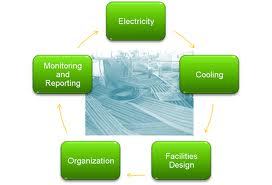What Does It Really Mean To Be Green?
Many cloud computing providers get a lot of press about energy consumption. But if they're using using coal-fired electricity, claims of green are overblown. Even a recent study from The national Resources Defense Council (NRDC) and WSP Environment & Energy seems to say that lower energy use is equivalent to greener. It's time to get serious about measuring carbon emissions, not just PUE.
 That's the assertion by Brian Proffitt, a book author and adjunct instructor at the Mendoza College of Business at the University of Notre Dame. Location of the datacenter, other datacenter emissions and lack of transparency into CO2 emissions should also be taken into account, but are often not when companies issue press releases about their "green" clouds or datacenters.
That's the assertion by Brian Proffitt, a book author and adjunct instructor at the Mendoza College of Business at the University of Notre Dame. Location of the datacenter, other datacenter emissions and lack of transparency into CO2 emissions should also be taken into account, but are often not when companies issue press releases about their "green" clouds or datacenters.
In a scathing blog, Proffitt takes the industry to task for its lack of transparency over how green their datacenters really are.
He starts off with Facebook as an example. Now, Facebook is known for its Open Compute Project to develop highly energy-efficient datacenters and sharing that work with others. And, we would note, Facbook started posting a breakdown of its carbon footprint last summer, along with a promise to increase its use of clean and renewable energy, drawing praise from Greenpeace for its transparency. However, Proffitt notes that the Open Computer Project datacenter in Princeville, Oregon, gets its electricity from utility company Pacificorp, which gets 70 percent of its power from fossil fuels – 58 percent from coal and 12 percent from natural gas. (While relatively clean, natural gas is not a renewable resource.)
Further, he points out that Princeville only improves its ratio of carbon emissions to power consumed very slightly in comparison with its other datacenters.
Still, Facebook should at least be praised for its openness on the subject, and Proffitt acknowledges that. Amazon, which is being roundly criticized by Greenpeace, is an example of a company with a closed-mouth policy. The company claims that its Oregon and GovCloud facilities use "100 percent carbon-free power," but offers no evidence of the claim. He also criticizes Salesforce.com's Carbon Calculator, which claims to show potential customers how much less carbon they would use if migrating to the company's cloud services. Proffitt gets his numbers largely from Tom Raftery, a GreenMonk analyst.
Overall, Proffitt – and Raftery – are correct. It is time for the industry to become more open about their carbon emissions if it wants to dampen criticism about the amount of power it uses. A good place to start would be Green Grid's Carbon Usage Effectiveness (CUE) measure. In the meantime, at least companies like Facebook (and Google) are starting to show the way.










